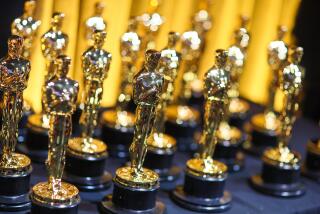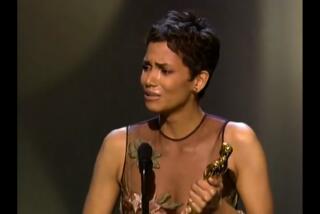High-Profile Academy Award Assignment a Public Relations Gold Mine for Price Waterhouse
It is a night that can lift careers and make or break movies--a night that commands an international audience and television advertising worth $1 million a minute. Without question, it is the entertainment world’s signature event of validation and glitz.
Yet removed from the preening entrances and occasionally daffy speeches, the success of tonight’s 64th Annual Academy Awards rests ultimately in the hands of a soft-spoken, slightly rumpled accountant from Westwood.
As the chief of Price Waterhouse’s entertainment practice, Franklin R. Johnson for 16 years has been responsible for distributing, collecting and counting Oscar ballots. He’ll be one of the tuxedoed men quickly introduced during the Oscar broadcast--possibly not without weathering another gibe about the ceremony’s arcane rules.
For Johnson, the jokes are easily endured: The Academy of Motion Picture Arts and Sciences account is far from Price Waterhouse’s biggest. But there is none more important.
“It’s been spectacular for them,” said a partner at another Big 6 accounting firm who has tried unsuccessfully to wrest the business from Price Waterhouse. “It’s created a recognition for them that’s immeasurable.”
Devoid of flashy jewelry, anything but glib, the 55-year-old Johnson is safely apart from the image of Hollywood--even if he is a movie buff. “I try to see most of the films in the major categories,” he says.
But more importantly for his client and for his firm, Johnson knows that the stature and lure of the Academy Awards hinge on two core commodities: breathless suspense--and a balloting process of unquestionable integrity.
Johnson and a colleague at Price Waterhouse, Daniel R. Lyle, are responsible for guaranteeing both. Each notes with pride that during the 56 years that their firm has collected and counted ballots for the Oscars, never has there been a hint of skulduggery.
And unlike leaked Supreme Court nominations or whispers about air strikes on faraway foreign targets, not once has word of an Oscar winner spilled on Price Waterhouse’s watch.
“It’s the hallmark of the telecast. I mean, nobody knows until that envelope opens,” said Robert J. Cagliero, an executive vice president for ABC, which is broadcasting the program at 6 p.m. tonight.
Cagliero and the network have more than a passing interest in keeping the winners a secret. At a rate of $550,000 for each 30-second commercial, ABC stands to collect $23.1 million in advertising revenue during the three-hour telecast.
“The secrecy is what gives the Academy Awards drama, it’s what gives the awards excitement,” said Price Waterhouse’s Lyle, 46. “That we can control, through extreme care. And that is of absolute importance.”
Here’s how it works:
As of March 11, ballots were delivered to all 4,976 members of the academy who are eligible to vote. The ballots were returned by mail to the downtown Los Angeles offices of Price Waterhouse, where Johnson and Lyle verified their authenticity and stored them in a vault.
Assisted by seven other accountants and one secretary, the counting for each of the 23 categories began Wednesday morning and ended Friday evening.
Johnson and Lyle said they sort the ballots to be counted by their eight subordinates to mask the emergence of any nominee as a likely winner.
“We de-randomize it so they don’t know if they have a representative sample,” Lyle said. “Each one of them sits in a room isolated from the others.” Much like members of a jury during a trial, Lyle said, the staff members are admonished not to discuss the results of their counting, “even within the group.”
Would defiance be career-threatening?
“Yes,” Lyle said, unhesitatingly.
On the night of the awards, Johnson and Lyle guard against emergencies by riding to the event in separate cars with duplicate envelopes containing the names of the winners.
In short, it amounts to a strategy for secrecy befitting a covert civilian operation. And it has been tested--at least once.
“Chevy Chase once pulled a $1,000 bill out of his pocket and told us he just wanted one answer in his monologue,” Lyle said, explaining that the offer came at a final rehearsal. “We were both dumbfounded. . . . I had never seen a $1,000 bill before. . . . Otherwise, I’ve never had anybody try to pry the winners out.”
In addition to the awards, Price Waterhouse prepares tax returns and any financial statements issued by the academy. Johnson said annual billings to the academy are “close” to $30,000 for what he estimated is 2,000 to 3,000 hours of work a year. Suffice it to say that the academy is billed at a rate dramatically lower than the $100 per hour or so that the firm charges other clients.
Over the years, other accounting firms have tried to pry the visibility-boosting academy account away from Price Waterhouse.
“We get offers every year from other accounting firms to do this for nothing or to pay us for doing it,” said Bruce Davis, the academy’s executive director. “ . . . We have not considered changing firms. Price Waterhouse has never dropped the ball. They have treated it with utmost seriousness.”
At Price Waterhouse--where entertainment industry clients make up the biggest single block of the firm’s business in Los Angeles--Johnson said it is impossible to gauge precisely the rain-making--or client-generating--value of the Academy Awards.
“It’s so hard to quantify,” he said, “because you never really know why someone calls you to do something for them.”
Confidentiality and integrity of the process notwithstanding, which film does Johnson-the-movie-goer prefer for best picture?
“I have always preferred not to state,” he said with a smile. “Often, my picks don’t win.”
More to Read
The biggest entertainment stories
Get our big stories about Hollywood, film, television, music, arts, culture and more right in your inbox as soon as they publish.
You may occasionally receive promotional content from the Los Angeles Times.











